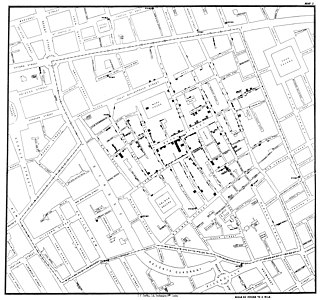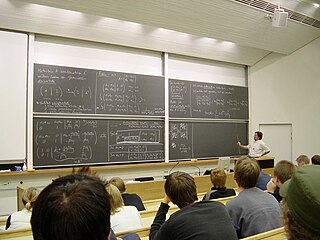
Human geography or anthropogeography is the branch of geography that is associated and deals with humans and their relationships with communities, cultures, economies, and interactions with the environment by studying their relations with and across locations. It analyzes patterns of human social interaction, their interactions with the environment, and their spatial interdependencies by application of qualitative and quantitative research methods.

The International Astronomical Union is a nongovernmental organisation with the objective of advancing astronomy in all aspects, including promoting astronomical research, outreach, education, and development through global cooperation. It was founded in 1919 and is based in Paris, France.

Research is "creative and systematic work undertaken to increase the stock of knowledge". It involves the collection, organization and analysis of information to increase understanding of a topic or issue. A research project may be an expansion on past work in the field. To test the validity of instruments, procedures, or experiments, research may replicate elements of prior projects or the project as a whole.

Economic geography is the subfield of human geography which studies economic activity and factors affecting them. It can also be considered a subfield or method in economics. There are four branches of economic geography. There is, primary sector, Secondary sector, Tertiary sector, & Quaternary sector.

In contemporary education, mathematics education is the practice of teaching and learning mathematics, along with the associated scholarly research.

The Royal Geographical Society (RGS) is a learned society and professional body for geography based in the United Kingdom. Founded in 1830 for the advancement of geographical sciences, the Society has 16,000 members, with its work reaching the public through publications, research groups and lectures.
Educational research refers to the systematic collection and analysis of data related to the field of education. Research may involve a variety of methods and various aspects of education including student learning, teaching methods, teacher training, and classroom dynamics.
College and university rankings are rankings of institutions in higher education based on combinations of various factors. None of the rankings give a comprehensive overview of the strengths of the institutions because all select a range of quantifiable characteristics to base their results on. Rankings have been conducted by magazines, newspapers, websites, governments, and academics. In addition to ranking entire institutions, organizations rank programs, departments, and schools. Rankings consider various combinations of measures of funding and endowment, research excellence and/or influence, specialization expertise, admissions, student options, award numbers, internationalization, graduate employment, industrial linkage, historical reputation and other criteria. Various rankings mostly evaluating on institutional output by research. Some rankings evaluate institutions within a single country, while others assess institutions worldwide. The subject has produced much debate about rankings' usefulness and accuracy. The expanding diversity in rating methodologies and accompanying criticisms of each indicate the lack of consensus in the field. Further, it seems possible to game the ranking systems through excessive self-citations or by researchers supporting each other in surveys. UNESCO has questioned whether rankings "do more harm than good", while acknowledging that "Rightly or wrongly, they are perceived as a measure of quality and so create intense competition between universities all over the world".

Environmental studies is a multidisciplinary academic field which systematically studies human interaction with the environment. Environmental studies connects principles from the physical sciences, commerce/economics, the humanities, and social sciences to address complex contemporary environmental issues. It is a broad field of study that includes the natural environment, the built environment, and the relationship between them. The field encompasses study in basic principles of ecology and environmental science, as well as associated subjects such as ethics, geography, anthropology, policy, education, politics, urban planning, law, economics, philosophy, sociology and social justice, planning, pollution control and natural resource management. There are many Environmental Studies degree programs, including a Master's degree and a Bachelor's degree. Environmental Studies degree programs provide a wide range of skills and analytical tools needed to face the environmental issues of our world head on. Students in Environmental Studies gain the intellectual and methodological tools to understand and address the crucial environmental issues of our time and the impact of individuals, society, and the planet. Environmental education's main goal is to instill in all members of society a pro-environmental thinking and attitude. This will help to create environmental ethics and raise people's awareness of the importance of environmental protection and biodiversity.

The Geographical Association (GA) is an association in the United Kingdom. The organisation aims to improve geographical knowledge of the public through promoting geographical education. It is a registered charity and is independent of state aid.
The International Geographical Union is an international geographical society. The first International Geographical Congress was held in Antwerp in 1871. Subsequent meetings led to the establishment of the permanent organization in Brussels, Belgium, in 1922.
The National Council for the Social Studies (NCSS) is a U.S.-based association devoted to supporting social studies education. It is affiliated with various regional or state level social studies associations, including: the Middle States Council for the Social Studies, the Washington State Council for the Social Studies, the New York City UFT Association for the Teaching of Social Studies, the Michigan Council for the Social Studies, Massachusetts Council for the Social Studies, and Virginia Council for the Social Studies. They publish several journals; their flagship publication being a peer-reviewed journal titled Social Education which, according to their website, aims to strike "a balance of theoretical content and practical teaching ideas." They sponsor the high school honor society Rho Kappa.
The Association for Asian Studies (AAS) is a scholarly, non-political and non-profit professional association open to all persons interested in Asia and the study of Asia. It is based in Ann Arbor, Michigan, United States. With approximately 6,000 members worldwide, from all the regions and countries of Asia and across academic disciplines, the AAS is the largest organization focussing on Asian studies.

Jisc is a United Kingdom not-for-profit company that provides network and IT services and digital resources in support of higher education institutions and research.

Chemistry education is the study of teaching and learning chemistry. It is one subset of STEM education or discipline-based education research (DBER). Topics in chemistry education include understanding how students learn chemistry and determining the most efficient methods to teach chemistry. There is a constant need to improve chemistry curricula and learning outcomes based on findings of chemistry education research (CER). Chemistry education can be improved by changing teaching methods and providing appropriate training to chemistry instructors, within many modes, including classroom lectures, demonstrations, and laboratory activities.

The five themes of geography are an educational tool for teaching geography. The five themes were published in 1984 and widely adopted by teachers, textbook publishers, and curriculum designers in the United States. Most American geography and social studies classrooms have adopted the five themes in teaching practices, as they provide "an alternative to the detrimental, but unfortunately persistent, habit of teaching geography through rote memorization". They are pedagogical themes that guide how geographic content should be taught in schools.
Journal ranking is widely used in academic circles in the evaluation of an academic journal's impact and quality. Journal rankings are intended to reflect the place of a journal within its field, the relative difficulty of being published in that journal, and the prestige associated with it. They have been introduced as official research evaluation tools in several countries.
Local history is the study of history in a geographically local context, often concentrating on a relatively small local community. It incorporates cultural and social aspects of history. Local history is not merely national history writ small but a study of past events in a given geographical area which is based on a wide variety of documentary evidence and placed in a comparative context that is both regional and national. Historic plaques are one form of documentation of significant occurrences in the past and oral histories are another.

The National Council for Geographic Education (NCGE), chartered in 1915, is a non-profit scientific and educational society in the United States that promotes and supports geography education.
The Bulletin of the Council for Research in Music Education is a quarterly academic journal covering music education. It is published by the University of Illinois Press on behalf of the Council for Research in Music Education.











